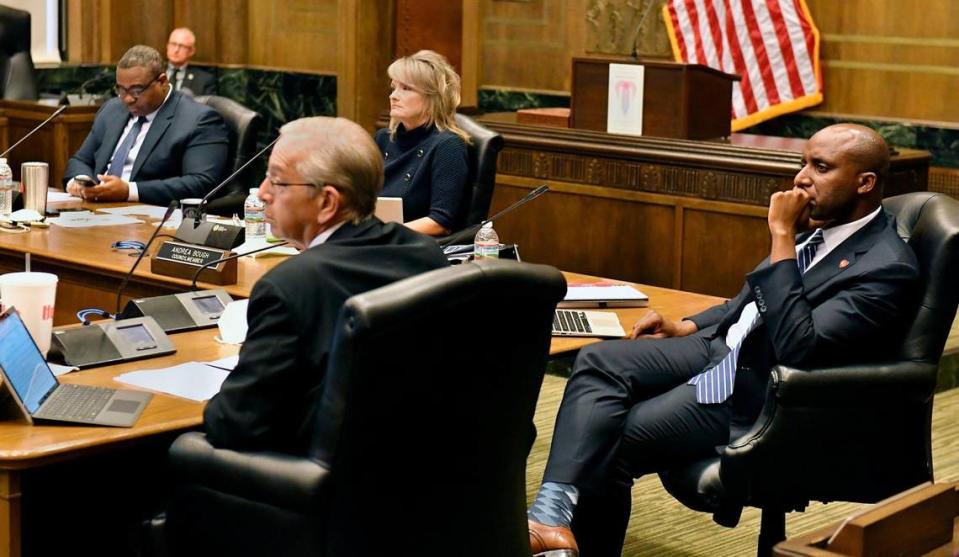Is $1,200 a month affordable rent? KC Council mulls relaxing rules on private developers
The Kansas City Council will consider relaxing affordable housing requirements for private developers on Thursday after a measure pushed by Mayor Quinton Lucas got its first approval.
Dozens of opponents with the advocacy group KC Tenants packed the council chamber on Wednesday to protest changes in the city’s housing and incentive policies.
Lucas last week unveiled a legislative package that would relax recent rules that require most residential development projects seeking city incentives to set aside a certain share of new units designated as affordable.
The proposal also would fundamentally alter the approval process for projects receiving taxpayer incentives by allowing the city manager to greenlight them rather than the City Council and economic development boards that now have oversight.
A committee approved one piece of the package on Wednesday, moving it to the full City Council for consideration. That piece seeks to back off of an ordinance enacted in 2021 that requires one fifth of the units in most taxpayer-subsidized apartment buildings to be affordable. Half of those must be affordable to families earning 70% of the area median income and the other half to those earning 30%.
Last week’s proposal would change that. In exchange for incentives, developers would have to set aside one fifth of their units to those earning 60% of the area median income.
At that rate, the city would deem a one-bedroom apartment that costs $1,172 per month affordable to a single person.
Opponents say those figures are unrealistic for working-class tenants.
Lucas is pushing the change because he says the 2021 rules just aren’t working.
The Economic Development Corporation of Kansas City saw an influx of incentive applications in the months leading up to the implementation of the new rules. But it hasn’t seen any applications for projects with incentives that fall under the affordability rules since.
“Unfortunately, since that time we’ve not seen the production of units ,” Lucas said Wednesday.
But critics say the mayor is giving up too soon.
Developers rushed in 31 incentives applications for multifamily projects in 2021 before the new rules took effect. Only eight applications were received in the three years prior, said Geoff Jolley, executive director of Local Initiatives Support Corp., a nonprofit community development group.
Jolley said those projects are still in various stages of development. With so many in the pipeline, the policy hasn’t truly been tested yet, he said.
“We are prematurely reviewing an ordinance that hasn’t even had time to take effect yet,” he said.
Jolley worked on a committee of community members and developers who have been studying the city’s incentive policies for months. At first, developers balked at the affordable housing set-aside because there wasn’t dedicated funding to help developers build the affordable units. Now the city has an affordable housing trust fund, but developers haven’t attempted to access it, he said.
“We have created the mechanism and they don’t want to use it,” Jolley said.
Last month, the city made its first appropriations from the housing trust fund. It plans to spend $8 million on 14 affordable housing projects undertaken by nonprofits and neighborhood groups.

Councilman Dan Fowler, who represents the city’s 2nd District, defended private developers, who he said can’t make money with the city’s current affordability rules.
“The hard cold fact is that developers are in this business to make money,” he said. “I don’t begrudge them that. Few of us would go to work if we didn’t get paid.”
The mayor’s plans have been opposed by local taxing jurisdictions who bear the brunt of development tax breaks and KC Tenants, who say the proposals reduce the city’s commitment to creating housing that is truly affordable for the most vulnerable renters.
“This ordinance does nothing to create affordable housing in Kansas City. All it does is create profits for developers,” said Mary Allison Joseph, a staff member of Trinity United Methodist Church in Midtown and a KC Tenants member.
KC Tenants says the city’s definition of affordability is out of whack because the figures used are inflated. The federally set median area income that the city relies on averages the incomes of homeowners and renters across the metro area, in rich areas and poor. A better yardstick would be the average earnings of renters within Kansas City, the group says.
“1,200 a month for a 1-bedroom apartment? They’re out of their minds,” Sabrina Davis, a leader with the renter advocacy group, said during a Tuesday media call opposing the mayor’s plans.
In pushing for the policy change, Lucas has publicly referenced family members, including his mother, who have struggled to find affordable homes. He said he wants to see affordable options across the city, not concentrated in a few areas.
But critics say its unclear what population the mayor’s new threshold would serve — or even if there’s a need at those levels.
A family of three earning about $53,000 per year, for instance, would qualify for a subsidized two-bedroom apartment that rents for $1,319 per month.
Kansas City Public Schools has asked the mayor to hold off on his proposal until its full board can consider the implications. School leaders have for years been asking for more say in how city officials award incentives for developers, which can deprive schools of future potential property tax revenue.
KCPS has tracked a spike in the amount of incentives being approved within its boundaries. The school system says the amount of property tax abatements increased by 60% between 2017 and 2020. Officials estimate that developer incentives cost the schools $37 million in 2021.
The school system also balked at the mayor’s proposed threshold for affordability.
“KCPS teachers have some of the highest starting first-year salaries in the metro,” said Kathleen Pointer, senior policy strategist for the school system. “And $1,200 for a one-bedroom is unaffordable to them, as it is for many city workers.”

 Yahoo Movies
Yahoo Movies 